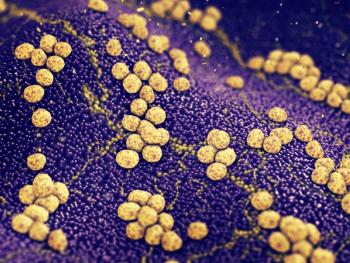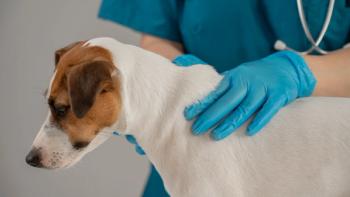
Just Ask the Expert: How do you manage canine chin acne?
Veterinary dermatologist Dr. Ian Spiegel offers his advice.
Dr. Spiegel welcomes dermatology questions from veterinarians and veterinary technicians.
Q. What is the recommended treatment protocol for canine acne in a 2-year-old Great Dane? Two three-week-long treatment courses with 960 mg trimethoprim-sulfadiazine (two tablets b.i.d. as a loading dose followed by one tablet b.i.d.) have greatly improved this dog's condition, only to have it recur a month or two later. The chin is the only affected area. Will the dog outgrow this problem, or is it likely to be a chronic condition requiring ongoing attention?
Ian Spiegel, VMD, MHS, DACVD
A. Canine chin acne is best classified as muzzle folliculitis and furunculosis. Folliculitis is defined as inflammation of a hair follicle. When a hair follicle becomes impacted (e.g. keratinous or sebaceous material) or infected, the follicle will rupture. This is referred to as furunculosis.
Muzzle folliculitis and furunculosis in this patient is most likely associated with the short bristle-like chin hairs that are prone to inflammation associated with the minor daily trauma that occurs when the chin rubs on surfaces. Usually antibiotics and long-term topical care (e.g. medicated wipes and ointments) will prevent this condition from progressing. In moderate to severe cases, oral antibiotics may be indicated. Failure to respond may be due to a resistant infection, so bacterial culture and antimicrobial sensitivity testing may be indicated.
Additional potential underlying causes for this condition include demodicosis, eosinophilic folliculitis and furunculosis, contact irritation, autoimmune disease, dermatophytosis, Malassezia dermatitis, histiocytosis, metabolic disease, allergies, and neoplasia. Some of these conditions cause pruritus. This increased itch sensation predisposes the patient to increased self-trauma and, in turn, folliculitis and furunculosis. If a poor response to initial treatment occurs, then a bacterial culture and sensitivity testing, skin scraping or hair pluck, fungal culture, Wood's lamp examination, needle aspirate, or skin biopsy may be indicated.
Unless a specific underlying cause is identified and managed (e.g. diet change, immunotherapy, cyclosporine), the condition may remain chronic or even progress.
It is not uncommon to need long-term preventive care to avoid a relapse. Topical medications such as mupirocin 2% or benzoyl peroxide gel may prove beneficial as maintenance treatments. Medicated wipes are also helpful, such as wipes containing chlorhexidine.
This condition is different from feline acne, which is a disorder of follicular keratinization possibly associated with poor grooming, seborrheic predisposition, abnormal sebum production, stress, or other causes. Follicular plugging with keratin material occurs on the chin or the lip margin, or both. As this condition progresses, dark-blue comedones and crusts form on the chin and may be associated with papules or pustules that may cause folliculitis and eventually furunculosis (deep infection in severe cases). Aside from a keratinization disorder (most likely), contact irritation has been suspected (e.g. plastic bowl), demodicosis, dermatophytosis, and allergies (all unlikely). In both dogs and cats, severe cases can be associated with bleeding and large crusts.
In summary, regardless of the underlying causes, dogs and cats should most likely be managed with oral or topical antibiotics, or both. If oral antibiotics are used, provide a four- to six-week course of treatment. If a poor response or relapse occurs, obtain a bacterial culture of the furuncle and use an appropriate antibiotic based on the sensitivity testing results. Some patients seem to respond after one course of treatment, while others are more challenging to manage. In my experience, this condition in cats and dogs tends to wax and wane.
Ian Spiegel, VMD, MHS, DACVD
Veterinary Specialty and Emergency Center
1900 W. Old Lincoln Hwy.
Langhorne, PA 19047
Animerge 24/7 Animal Emergency and Specialty Care
21 U.S. Hwy. 206
Raritan, NJ 08869
Newsletter
From exam room tips to practice management insights, get trusted veterinary news delivered straight to your inbox—subscribe to dvm360.




